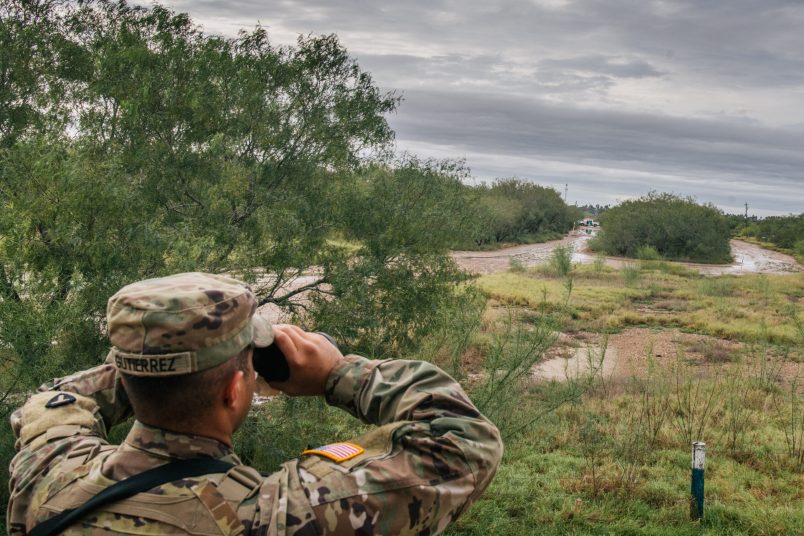As a Trump-era border policy allowing the federal government to turn back migrants without hearing asylum claims comes to an end this month, states and the federal government are preparing: for more migrants, more asylum claims, and a chance for a shift away from the Trump administration’s immigration enforcement stance.
But for Texas, the shift presents new opportunities to challenge long-standing interpretations of federal law and the constitution, taking advantage of the hard right majority on the Supreme Court.
The Trump-era policy, Title 42, comes to an end on May 11. Conservatives have sought to stoke panic about what could follow, including what they describe as yet another nightmare vision of undocumented migrants overrunning the border.
But beyond the feverish messaging, Texas Republicans are using the end of the policy as another way to strike at longstanding national immigration policy by lobbing a Hail Mary at the Supreme Court.
State politicians are seeking to challenge and potentially overturn U.S. v. Arizona, a landmark 2012 decision which affirmed that only the federal government — not states — has the authority to enforce immigration law.
Part of the effort to build a case has involved an all-out public relations campaign to suggest that, as Title 42 ends, the federal government is abdicating its responsibility to enforce the border.
Lt. Chris Olivarez of the Texas Department of Public Safety portrayed the issue in those terms in an interview with Fox News last week.
“This is the responsibility of the federal government, yet we in Texas have been put in a predicament where we have to do something about it because the federal government has failed to secure the border and protect the American people,” he said, adding that migration issues would “get much worse once Title 42 is lifted.”
As the state’s legislature meets for its biannual session, it is moving forward various attempt to rewrite national immigration law, some of which would openly conflict with the court’s ruling in U.S. v. Arizona.
Last month, the Texas Senate passed SB 2424, a law that would make “improper entry from a foreign nation” a state-level crime. In the state House, lawmakers are considering the creation of a “Border Protection Unit,” empowered both to hire vigilantes and to “repel” and “return” undocumented migrants that members of the unit see crossing the border.
That proposal, HB 20, has attracted condemnation from immigrant rights groups and from criminal justice advocates; it has been called a “priority” by Texas House Speaker Dade Phelan (R). Lawmakers voted HB 20 out of Committee on Friday, setting the stage for its potential passage.
The Border Protection Unit would be under Gov. Greg Abbott’s (R) direct control, giving him what some advocates describe as a state-level paramilitary force capable of overriding federal border authority.
It’s all in direct contravention of the 2012 Supreme Court decision, which came after Arizona passed laws in 2010 criminalizing being an undocumented immigrant in the state. The Supreme Court struck down those statutes, affirming what had been the principle in the U.S. since the 19th century: that the federal government is responsible for enforcing border laws.
Other Texas officials have stated directly that they want to challenge the Arizona decision.
Lt. Gov. Dan Patrick (R) obliquely referenced the decision in a statement lauding the state Senate’s decision to make crossing the border a crime.
“Since the federal government has abdicated its constitutional responsibility to secure our border, Texas must step into the breach,” he said, adding that the bill would “allow Texas to take matters into our own hands and make illegal entry into Texas a state crime.”
State Attorney General Ken Paxton (R) was more blunt in March testimony before the state Senate’s Border Security Committee.
Paxton, a connoisseur of feverish right-wing conspiracy theories, described the Arizona decision as “the one that we are the most frustrated with” in terms of immigration enforcement.
“I’ve been saying for two years, we should test U.S. v. Arizona,” Paxton said, saying separately that “we’ve got a different Court.”
“We’ve got the best chance we’ve ever had to overturn that and give the states the ability to protect their citizens, because if we can’t do it we leave our citizens unprotected in various ways,” he added.
Other conservatives who are chomping at the bit for changes to the nation’s constitutional structure have also cast their lot in with Texas’ bids to annex border enforcement authorities to itself.
Mark Meckler, a former Tea Party activist, staged a rally in Austin on Saturday in support of HB 20.
Meckler runs the Convention of States Foundation, a states rights-focused non-profit which aims to call a Constitutional convention in order to “bring power back to the states.”
At the rally, Meckler, along with Ted Nugent, Rep. Chip Roy (R-TX), and others called for the state legislature to pass HB 20, and for state lawmakers to formally declare an “invasion” — a quixotic legal theory floated by Justice Antonin Scalia in his dissent in the 2012 Arizona decision which could form the basis for a challenge before the Supreme Court.
Meckler initially agreed to speak with TPM about his support for the Texas initiatives to overturn U.S. v. Arizona, but backed out of the interview at the last minute.






